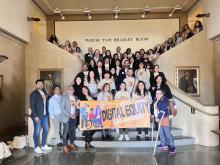“Wired for Freedom” Livestream Replay
If you missed our Building for Digital Equity “Wired for Freedom” Livestream, you can watch it in its entirety on YouTube.
Earlier this week, the second UTOPIA Fiber-sponsored event of the year, hosted in partnership with the National Digital Inclusion Alliance (NDIA), brought together community-based digital inclusion practitioners and policy experts to talk about the road ahead for expanding broadband access amid a rapidly shifting political landscape.
After a blues-infused beginning with Sky Downing of digitalLIFT, NDIA’s policy director Amy Huffman provided attendees with an update on the long court battle over the constitutionality of the FCC’s Universal Services Fund.
The recent Supreme Court ruling, Huffman explained, ruled that the program – which supports connectivity for rural communities, schools, and libraries – was indeed constitutional. In what Huffman described as “good news,” she also said it would give Congress a chance to reform USF without having to do so as “a ticking time,” giving lawmakers and advocates a chance to “put together a thoughtful framework and path forward to ensure that the fund not only continues but is modernized.”
In the lightning round presentations, Sara Nichols from the Land of Sky Regional Council in western North Carolina spoke of the work her planning agency has been involved with working toward building resilient connectivity in the wake of Hurricane Helene followed by Kaala Souza, executive director of Digital Ready Hawaii, who discussed how digital literacy was rooted in the local culture’s emphasis on literacy dating that dates back before the dawn of the computer age.





